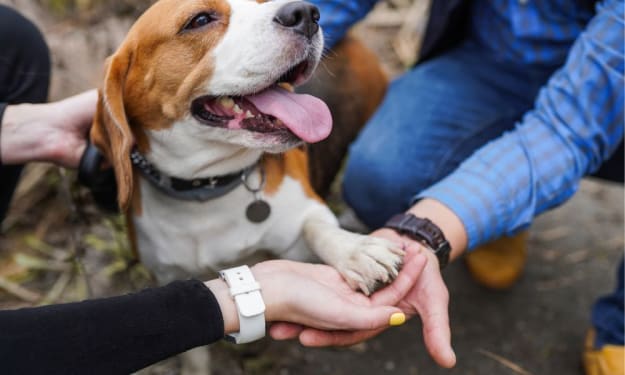Why Your Dog is Overweight
Getting them back to their proper weight

With an estimated 60% of dogs in the United States being overweight or obese, canine obesity is an increasing concern. This can result in a variety of health issues, such as joint pain, heart disease, and a shortened life span. The first step in preventing and treating obesity in your pup is to understand why it occurs.
1. Overeating and Inactivity
Overeating and a lack of exercise are the two most frequent factors in canine obesity. A dog will gain weight if it consumes more calories than it expends, just like humans do. That is why it’s important to feed your dog the right foods. When dogs receive excessive amounts of food, high-calorie treats, or leftover table food, this may occur. Dogs also require frequent exercise to maintain a healthy weight. Without sufficient physical activity, dogs are more likely to gain weight.
2. Genetics
Genetic predisposition causes some dogs to be prone to obesity. Due to their slow metabolism and propensity to overeat, some breeds, including Beagles, Basset Hounds, and Cocker Spaniels, are more prone to weight gain. It's crucial to check your pet's food consumption and calories and make sure they get adequate exercise if you have a breed that is prone to obesity.
3. Health Conditions
A dog may gain weight as a result of specific medical issues. For instance, a dog's metabolism might be slowed down by hypothyroidism, a common hormonal condition that can result in weight gain. Additional medical diseases that might cause weight gain include diabetes and Cushing's disease. If you believe your dog's gaining weight because of a medical problem, you should take them to the vet for an accurate diagnosis and treatment strategy.
4. Feeding Customs
Due to their eating habits, some dogs end up being overweight. Dogs can be fed on a schedule and can avoid overeating and weight gain by employing portion control. For instance, feeding them twice a day but in smaller portions. However, some dogs may gain weight as a result of inconsistent feeding schedules or excessive treats and table scraps. It's crucial to develop and adhere to a feeding schedule, and to reserve sweets and leftovers from meals for special occasions.
5. Lack of Knowledge
Finally, some dog owners can be unaware of their dog's obesity. They could not be unaware of the issue that their dog's weight is causing, not know how much they should feed their pup or what they should be feeding their dog. It's crucial for dog owners to educate themselves about the breed, size, and degree of activity of their dogs and to seek a veterinarian's advice when deciding on the right diet and exercise routine for their pets.
Treatment and Prevention of Dog Obesity
Being provided a balanced diet and getting regular exercise are the greatest ways to prevent obesity in dogs. Scheduled feeding of dogs and portion management can help prevent overeating, and regular exercise can help burn calories and maintain a healthy weight. Additionally, it's crucial to keep treats and table scraps to a minimum and to feed your pet the appropriate low-calorie foods to prevent weight gain.
The best course of action if your dog is already overweight is to speak with a veterinarian. Your veterinarian can assist you in identifying the reason of your dog's weight increase and in creating a treatment strategy that is specific to that animal's requirements. If a medical condition is the cause of the weight gain, this may entail treating the disease with medication or other treatments in addition to modifying your dog's diet and exercise schedule.
Obesity in dogs is a problem that is on the rise and can cause a variety of medical issues. The first step in avoiding and treating obesity is to understand its causes, which include overeating, heredity, medical issues, eating habits, and a lack of awareness. By adjusting what your dog eats, how much they eat, and giving them the proper amount of exercise and activity, the majority of dogs will get back to their proper weight. However, if after a period of time, you do not see a change in your dog’s weight, and you have been following the proper routine, then you should consider taking your pup to a veterinarian for a check-up and discuss what the appropriate strategy would be to reduce your dog’s weight.
About the Creator
Enjoyed the story? Support the Creator.
Subscribe for free to receive all their stories in your feed. You could also pledge your support or give them a one-off tip, letting them know you appreciate their work.





Comments
Keyword Wealth is not accepting comments at the moment
Want to show your support? Send them a one-off tip.